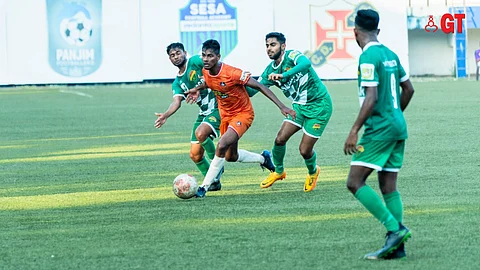

BY AUGUSTO RODRIGUES
Football has that charm that endears it to all Goans. However, competition – the cornerstone of growth – is not competitive enough in Goa, to push the game to professional heights as was evident at the end of the just concluded Goa Football Association (GFA) age-group tournaments.
“Competition helps get the best out of our boys, and there is competition in Goa, but it is not competitive enough. To be the best, our players need to play against the best and that is missing in Goa,” claims Derrick Pereira, the only Indian to have won the national football title as a player and coach.
Derrick is the technical director of youth development with FC Goa, and their age-group team beat the Sesa Football Academy team 29-0. This is just one of the many one-sided wins enjoyed by his team and the result of many matches.
Surprisingly, teams from Dempo SC, Goa Football Development Council (GFDC) and Sesa FA – all having residential academies – were nowhere close to being competitive enough despite being in the news before the pandemic.
Yet, teams with non-residential academies, Salgaocar FC being another, seem to be faring better in terms of producing players.
FC Goa’s under-age teams’ success in Goa could not be replicated in all India competitions and that explains the one-sided loop that football in Goa seems to be caught in.
“Teams with residential academies have an advantage because they monitor the A to Z of a player’s need 24/7. Non-residential academies do not have that luxury, and our players don’t get the opportunity to develop the hunger to excel as a player in an academy would,” thinks Derrick when asked to compare the two.
“In our days, the drive to excel was constant, and the same drive is missing in players as they get distracted easily. They lose rhythm when not in a residential academy,” bemoans Derrick.
“A lot of work can be seen happening to develop football, but there have to be proper follow-up programmes with a pathway for players in every club in the state,” reasons Derrick, who started as the number two coach of the FC Goa's first team before taking up his new role in grassroots development.
“It took me a while to adjust to my role as head of youth development as the trajectory is different. But, I am happy with what we have been achieving in terms of the number of players we are developing for our first team and will be for the country one day,” opines Derrick, who uses the latest technology to keep track of his boys’ progress.
“We search for technique and football sense when selecting players to join our set-up. It is difficult to get players having both, and it is then that we step in. Helping players develop an insight into the game is crucial,” believes Derrick.
“I am happy when I see the way we have conducted ourselves and not in terms of results. Everyone has put in an effort, but I think we could have done better as far as individual development is concerned. But, as a team, a lot of positive changes can be seen in the youth team,” avers Derrick, who won the ISL title for FC Goa in Best Youth Development in the recently concluded Indian Super League (ISL).
FC Goa has roped in Manolo Marquez as coach of the first team who is acknowledged as the only foreign coach to leave Indian players with polished potential, and Derrick is happy to share the platform with him.
“It is important that everyone works together in a team, and I am happy to know that Manolo is going to take interest in the youth team by sharing his inputs,” observed Derrick when asked to comment on the new signing.
“I want my boys to understand what it takes to play a game at the highest level. To do that, the emphasis will be on making them better human beings, because life is not just football, but football is part of life,” says Derrick.
“Whilst teaching them football, we need to teach them to survive in this world,” concludes Derrick, who after seeing the highs and lows of football is enjoying good times with and without the ball.